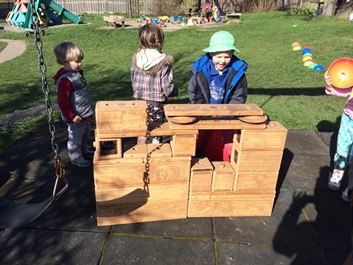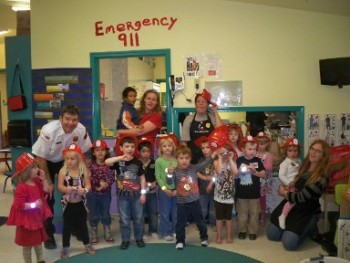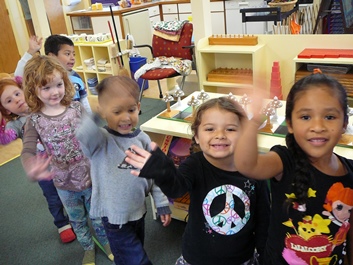— by Margie Doyle —
The first of many steps in establishing well-qualified preschool education for all Orcas children has been taken through the Early Childhood Education Initiative. In recent interviews, Orcas’ preschool directors and some parents talked about the first year of the three-year pilot project, the Early Childhood Education Initiative, where six private investors from the community came forward to fund the gap between tuition and school fundraisers and the actual cost of achieving program goals — the “cost of care.”
While all four preschools report progress on the first two benchmarks — to provide access to all Orcas’ children to preschool (at least 12 hours per week) and to improve the quality and pay rate of preschool employees — the third goal of sustainability seems harder to pin down, and preschool directors still face the reality of meeting the “costs of care” to stay open for business.
Orcas Issues met with the Directors of Salmonberry School, Orcas Children’s House, Orcas Montessori and Kaleidoscope Childcare Center to talk about how the fledgling “demonstration project” is working. Last year, the preschool directors and initiative managers met twice monthly, over a six-month period, to organize this effort. Jim Connell, a national education consultant, facilitated the meetings.
The ECEI distributes its funding in terms of need among the four preschools, with the collaborators agreeing on specific formulas and specific needs. The immediate effects of the distribution of funds through ECEI varies dramatically, while the outlook for reporting and sustainability are similar for the four institutions.
At Orcas Children’s House, director Susan Anderson said that when the four directors met over a period of time with ECEI founders Joe Cohen, Jim Connell, Martha Farish and Dale Heisinger, they asked themselves, “What constitutes quality?”
Anderson says, “We went immediately to access, with a minimum of 12 hours per week.”
At Children’s House, funding from the ECEI has meant that six of their students receive additional hours in the preschool program. “What an incredible opportunity it’s been for my son,” said the mother of a OCS five-year-old. “He’s always excited to go to school, and I can see how much he’s learning. The support has really helped us out.”
Anderson described the participation of the four preschools involved in the ECEI as “a wonderful collaborative agreement with a lot of trust involved to provided greater access to preschool to children in the greatest need.”
Children’s House preschool teachers already have the accreditation that is a primary goal of ECEI, and Anderson says, “Teacher quality is the number one factor in a child’s success in education.” In addition to student access and teacher qualifications, Children’s House needed classroom materials. Earlier this month, ECEI added funding to provide those materials and environmental improvements.
The four preschools are also moving toward collecting data to measure the impact of the ECEI, through the Early Achievers state rating program, which uses a variety of scales, such as:
- teacher-child interaction
- staff interactions
- environment
- materials
- outdoor-indoor play
to determine awards from $2,500 to $9,000. Washington is one of nine state to get this grant, and San Juan is the last county to be rated. It’s taken two years to get the information together, Anderson said.
“No matter how good a parent you are,” today’s kids need the preschool environment to be able to succeed in kindergarten and beyond, Anderson says. “The ECE Initiative is a really good step in a really good direction… The beauty of the ECEI is that it reduces the fundraising needed — to a degree.”
At Salmonberry School, Eliza Morris is the business manager and Paul Friedman is the program manager for the preschool-through-6th grade school.
Salmonberry is unique among the four organizations, in that it is licensed as a private school, while the others offer preschool programs through the business of childcare. That creates a challenge because as a private school, Salmonberry is not eligible for some state programs like Early Childhood Education and Assistance Program (ECEAP) and Working Connections.
Six preschool children between the ages of three and five are sponsored this year at Salmonberry through the ECEI. Morris says, “These are children who wouldn’t be able to attend were it not for ECEI.”
Twelve children are in Salmonberry’s Early Childhood Learning program every day. “Our philosophy is to meet each child where he or she is at, where that child can learn,” said Morris. “The ECEI is really special for us because we’ve been limited in our ability to offer scholarships to what we can fund-raise through the year, and we always fall short of the need. We’re still raising financial aid, ourselves, but with ECEI those six kids are here. And it’s the first time we’re full.
“I know the parents [benefiting from ECEI assistance] are very excited, because every time I see them, they go out of their way to say so.”
Salmonberry’s Natashja Milan is taking online courses through Childcare Aware, a state-approved professional development program; and is about halfway through the curriculum.
As a result of the collaborative meetings for the initiative, “The four schools have become way more aware of what we’re doing; and have gotten to know each other better; and that’s been of great value,” said Morris.
“Joe [Cohen] and Martha [Farish] are inspirational, with their leadership and desire to listen to every voice in the room before a decision is made. They take the time to get it right, not just a cookie-cutter approach. The process is just beginning. Our goal is to show to the community and on a national level the value of preschool education. It’s step one of many steps.”
Director Amber Paulsen of Kaleidoscope Childcare Center says it is unique in that many of its students benefit from the new statewide ECEAP assistance program, due in great part to the work of County ECEAP Director Sage MacLeod. “We definitely have Sage to thank, for her hard work and confidence in us,” Paulsen said.
The result is that funds from the Orcas ECEI are used to assist only one child’s family, that is “truly in need,” says Paulsen. “The ECEI grantors agreed to invest all access funding for one child [at Kaleidoscope] as the best use of that money.”
However, with the largest preschool, infant and after-school care program on Orcas Island, Kaleidoscope has four teachers that benefit from being helped with their training through the ECEI. “Almost all my staff are parents of young children. They are learning valuable tools as parents. And the wage increase decreases the stresses in the home,” says Paulsen.
She praises the approach and attitude of those spear-heading the Early Childhood Education Initiative. “I’ve appreciated the professionalism in bringing so many areas of our specialty together. Our views were heard and respected.
“It’s really admirable that their approach was, ‘How can we best support your schools?’ The value of working with Jim [Connell] and Joe [Cohen] is their ability to look at the numbers and keep coming back to something quantitative,” Paulsen said.
“The process was slow, and it needed to be. In the end ECEI supports our schools without changing our programs. That went a long way in saying the donors respected us and how we were doing our job. It has been challenging — and so important and valuable.”
The point is not simply to get more kids in to the school, because that also increases costs, she says. “They didn’t want to give us more deficit; but they were willing to pay for the hours of care at the rate it costs the school — and nobody does that. Government assistance never provides for the actual cost of care.”
“Cost of care” means the annual business expenses related to enrollment, such as staff time, overhead, utilities, audits, food and taxes. It is not covered by the tuition charged each family. “These costs were presented openly and honestly,” says Paulsen, in determining the formulae and benefits of ECEI assistance. Those funds are given only for the hours that the child attends the preschool; it is the responsibility of the parents to get the children to their preschool.
Parental involvement is critical to the program’s sustainability, the initiative funders say. “It matters that their child is involved in preschool and that they see it as a good thing for their child. We are dependent on parents for the success of this initiative.”
Paulsen says, “Our hands are often so very tied in order for our families to receive support — but we feel compelled to do whatever it takes. Both the Early Achievers rating program and the ECEAP involve substantial paperwork and reporting on regulation compliance — but without the money, we can’t keep our doors open.
“It feels very different with ECEI. The message was, ‘We trust you to do what’s best for your students.’ They asked us rather than telling us what we need to do our job.”
Orcas Montessori School with Director Teresa Chocano has made use of the accessibility funds from ECEI for six students and is requesting assistance for one more child. All Montessori preschool students spend 16-17 hours a week in the program. “We are committed to helping all families who apply for [tuition] assistance, which means we have spent the whole year fundraising to make it work, so we don’t have to turn away anyone,” said Chocano.
To meet the ECEI’s teacher-training goal, Montessori’s Emily McGerty is enrolled in Bellingham Technical College with a scholarship made available through Washington State. ECEI is helping to reimburse other expenses. Montessori is committed to the $14/hr wage that is the ECEI goal upon completion of teacher training.
Chocano says of the initiative, “We’ve collaborated over the years; for example, in the Dave Madison Literacy Program, a two-year project funded by the Community Foundation in response to a grant request written by Kari Schuh of the Orcas Island School District. This is another opportunity to work together. Jim Connell, Dale Heisinger, Martha Farish and Joe Cohen have really given so much of their time and thoughtful energy at the meetings and in talking to people, helping to make plans and arrive at decisions.
“Their openness to hearing from us and desire to really help families on the island — and the donors who are making this possible — really shows leadership. They are very open to requests for help. and very supportive in getting us the help we need.
“We can much more easily help working families who need assistance instead of pressuring them to pay a little more. It makes the burden of additional fund-raising less,” says Chocano.
A Montessori parent who has two children enrolled in the Montessori preschool says, “It’s a place to connect with other families and to improve academically and socially. It’s definitely something we couldn’t afford otherwise.” Both parents in this family work, and they say, “We’re very dependent on the scholarship for the kids to stay in school and for us to go to work.”
“Access to all Orcas children especially gives kids at higher risk more time in preschool environment with trained staff to develop better skills. I’m incredibly grateful that these folks from the ECEI came together. We’ve been talking for a long time how to help preschools with the financial requirements for sustaining Early Childhood Education. The challenge has been how to make something fair and helpful,” says Chocano.
“It’s a tremendous help… and we can focus more time and energy to focus on the children.”
Next steps
The community has become more aware of the importance of Early Childhood Education, all the preschool directors say. They hope that growing awareness expands the donor base so more children and their families can be helped; and the children, and greater community, will see the benefits.
In addition to measuring the outcomes in subsequent kindergarten classes, the next steps to demonstrate the impact of the ECEI are:
- organizing a “Friends of the Preschools” group in the local community to develop the tools to measure the outcomes;
- determine which additional fund-raising efforts are the best use of staffing time and energy;
- keep momentum of staff professional development ongoing and self-motivating;
- sustain the accessibility and staff training through community-wide donor participation.
All the preschool directors state the need for the community to participate in the ECEI and to help them provide high-quality Early Childhood Education: in the words of Children’s House Director Susan Anderson, “ECEI’s work has to be supported by the community; we’ve got to find other support mechanisms, because parents can’t afford the real costs of tuition.”
**If you are reading theOrcasonian for free, thank your fellow islanders. If you would like to support theOrcasonian CLICK HERE to set your modestly-priced, voluntary subscription. Otherwise, no worries; we’re happy to share with you.**












Thank you, Margie, for writing this very comprehensive article about the Early Childhood Education Initiative. It provides a clear, realistic, picture of it’s goals, accomplishments, and future sustainability challenges.
Ooops. As long as this is about education, I see that I made a usage error in my previous comment. Should have double-checked before clicking on “post comment”, because “its” would have been correct — no apostrophe.